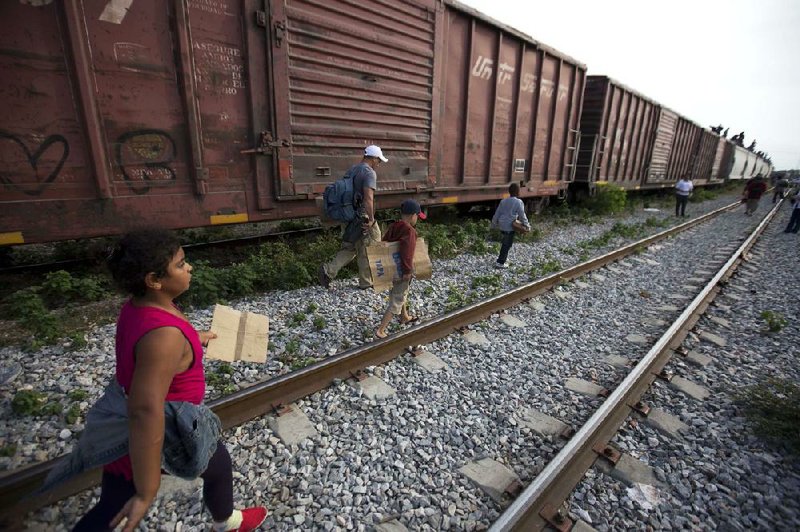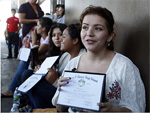WASHINGTON -- The House and Senate are not expected to agree before an August break on legislation to address an influx of Central American children at the U.S.-Mexico border because the two chambers are committed to opposing plans.
Senate Appropriations Committee Chairman Barbara Mikulski, D-Md., is expected to release as soon as today a supplemental spending proposal that would grant President Barack Obama much of the $3.7 billion he has requested to house, feed and process the children.
The legislation being finalized by Mikulski would spend $2.7 billion for more immigration judges, detention facilities and other resources for the southern border, Senate aides said. It also would include $225 million for Israel's Iron Dome, designed to intercept short-range rockets and mortar shells, as Israel battles Hamas militants, and $615 million to fight wildfires raging in the West.
Meanwhile, House Republicans are set to brief members on their plan, expected to be a fraction of that amount and to require a change in a 2008 law that was enacted to protect children from sex trafficking. Republicans say they won't agree to fresh spending without the change, which many Democrats oppose.
Sens. John McCain of Arizona and Lindsey Graham of South Carolina, Republicans who play leading roles on immigration, said they doubt there will be border legislation before lawmakers leave Washington in less than two weeks for an August break. Both parties are accusing each other of politicizing the issue.
In a statement Tuesday morning, House Speaker John Boehner of Ohio said Obama "backpedaled" on his earlier support for changing the 2008 law to make it easier to deport children from Central America after a quick interview with border agents.
The 2008 law guarantees judicial hearings for unaccompanied youths arriving here from Central America, which in practice allows them to stay in this country for years because of backlogs in the immigration court system.
"The lack of leadership from this White House, and President Obama's refusal to stand up to critics in his own political party, are jeopardizing our ability to find common ground and help the kids who are caught in the middle of this crisis," Boehner said.
Sen. Mary Landrieu, D-La., said, "It's hard to see a consensus building given the diverging views."
Senate Majority Leader Harry Reid, D-Nev., said the children are fleeing extreme poverty and violence and aren't seeking to take advantage of Obama's immigration policies.
"All we hear from Republicans in Congress is blame; it's all President Obama's fault," Reid said. "That is complete and utter nonsense."
He said that without congressional action, the departments of Homeland Security and of Health and Human Services "will run out of money" to house, feed and process the children in August.
The Congressional Budget Office estimated that only $25 million of Obama's request would be spent in fiscal 2014, which ends Sept. 30. Most of the funds would be spent in fiscal 2015. The budget office report said it assumed enactment of a spending plan in mid-to-late September, just before the fiscal year ends.
Republicans have seized on the finding to say a special spending measure isn't necessary and that the request can be handled as part of the regular spending process.
The result, lawmakers say, is that Congress probably will handle the matter the same way it's handled other spending disputes -- through a temporary spending fix. Congress has kept the government open for much of the past few years through temporary spending bills.
"No Republican is going to write a check for millions of dollars in aid without changing the underlying legal structure," Graham said.
"If the Democrats insist that everything is fine legally," Graham said, "they will get creamed in the fall" elections. "At best you'll have small amounts of money appropriated" to address the situation, he said.
More than 52,000 unaccompanied children were apprehended at the U.S.-Mexico border from Oct. 1 through June 15, about double the total in a similar period a year earlier, according to U.S. Immigration and Customs Enforcement. Most of the children came from El Salvador, Guatemala and Honduras.
A task force led by Texas Republican Rep. Kay Granger of Texas will recommend sending National Guard agents to the U.S.-Mexico border and adding judges to immigration courts to speed the deportation of unaccompanied minors. The group also will propose opening unprotected border areas, such as U.S. national parks, to Border Patrol agents.
Meanwhile, the Homeland Security Department said Tuesday that it arrested 192 people along the U.S.-Mexico border in South Texas on human-smuggling charges and seized more than $625,000, part of the Obama administration's efforts to discourage and disrupt the flood of people crossing the border illegally.
The arrests, which took place under a crackdown called "Operation Coyote," took place over the past month and were part of a 90-day effort targeting smuggling groups.
Immigration and Customs Enforcement said it seized the money from 228 bank accounts held by suspected human- and drug-smuggling groups and took into custody 501 illegal aliens during that time. Homeland Security Secretary Jeh Johnson said those not eligible for a visa or other protections would eventually be sent home.
Johnson said the crackdown on smugglers was another message that "our borders are not open to illegal immigration."
The Rio Grande Valley in South Texas is the Border Patrol's busiest spot along the Mexico border. Border agents have arrested more than 200,000 border crossers in the area some Oct. 1.
Information for this article was contributed by Heidi Przybyla, James Rowley and Erik Wasson of Bloomberg News and by staff members of The Associated Press.
A Section on 07/23/2014


